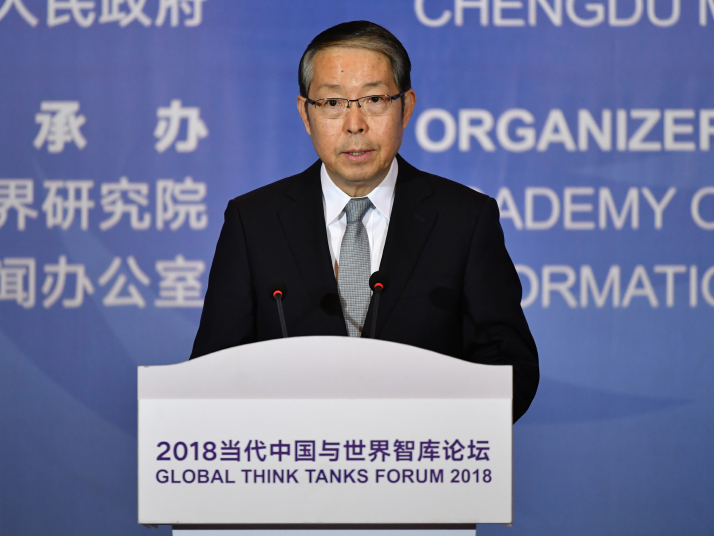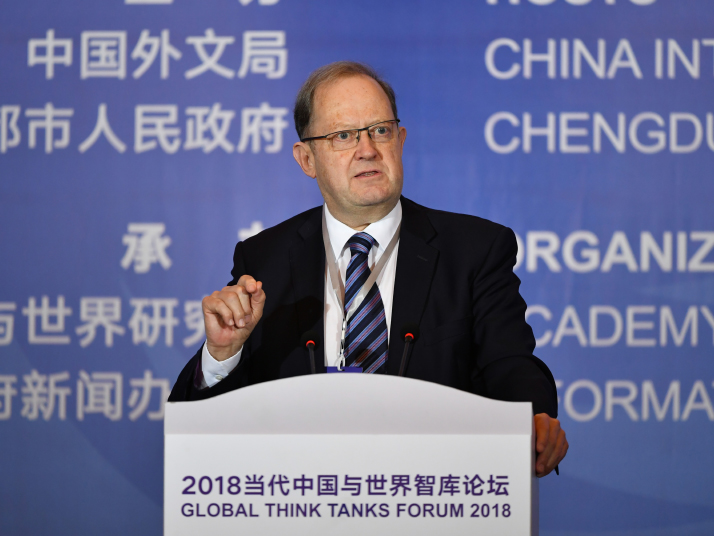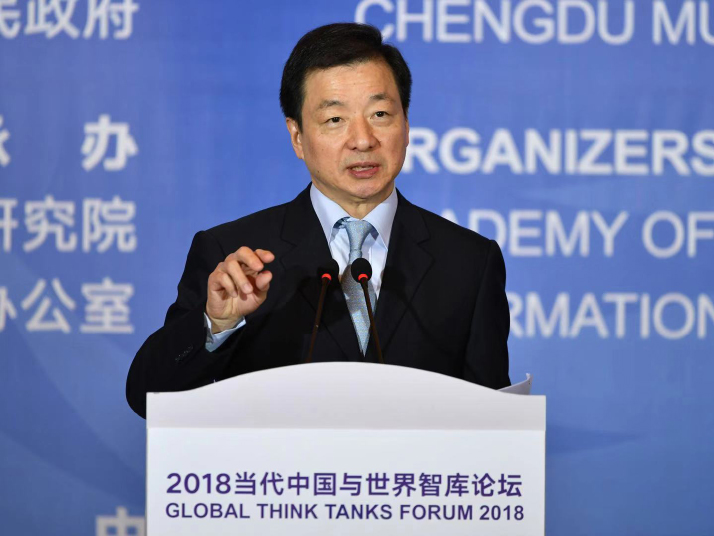|
||||||
|
||||||
| Home Nation World Business Opinion Lifestyle China Focus ChinAfrica Multimedia Columnists Documents Special Reports |
|
||||||
|
||||||
| Home Nation World Business Opinion Lifestyle China Focus ChinAfrica Multimedia Columnists Documents Special Reports |
| Nation |
| New Vision for a New Era |
| As the global order faces new challenges, think tanks meet in Chengdu to keep Track II diplomacy flowing |
| By Sudeshna Sarkar & Lu Yan | NO.49 DECEMBER 6, 2018 |
 The Global Think Tanks Forum 2018 kicks off in Chengdu, capital of southwest China's Sichuan Province, on November 22 (HU ZHOUMENG)
For more than six decades, Jose Vieira Loguercio had never made a trip abroad except for two brief forays to southern neighbor Argentina. The son of a trade unionist railway worker, the Brazilian had joined the leftist protest movement in 1964 and never had the luxury of going abroad. But last month, the 68-year-old spent nearly two days flying over two continents to arrive in Chengdu in southwest China to attend an event that brought together over 120 people of diverse backgrounds from 18 countries. "I am curious about the Belt and Road Initiative," said Loguercio, presently a researcher at the Mauricio Grabois Foundation in Brazil. "I know about the first phase and I want to know more about the second one."  Fang Zhenghui, Vice President of China International Publishing Group (DONG NING)
Role of think tanks The initiative proposed by Chinese President Xi Jinping in 2013 was one of the three focuses at the Global Think Tanks' Forum 2018 held in Chengdu on November 22-23 under the aegis of the China International Publishing Group (CIPG) and the Chengdu Municipal Government. In his keynote speech, Guo Weimin, Vice Minister of the State Council Information Office, outlined the reason for the brainstorming by international relation and economy experts, academics, activists and scholars. The world today faces crises of populism, protectionism and unilateralism, compounded by population explosion, climate change and unbalanced development. "Global governance needs the joint efforts of all countries and regions and their experts to promote exchange and provide a platform for the prosperity of all humanity," he said. John Ross, former Director of Economic and Business Policy of London and current senior fellow at Chongyang Institute for Financial Studies, Renmin University of China, enlarged the crucial role of think tanks, which can cooperate globally where governments may not and exchange factual information so that those in authority do not act on wrong ideas and misjudgment that could have "catastrophic consequences."  John Ross, former Director of Economic and Business Policy of London and current senior fellow at Chongyang Institute for Financial Studies, Renmin University of China (DONG NING)
Ross had examples from the past to show the devastation caused by such "miscalculations:" Japan believed if it invaded China, China would not fight back, which was a "catastrophically wrong assessment." In Germany, Adolf Hitler miscalculated the number of advanced tanks the Soviet Union possessed. "If he had known, he would have never invaded the Soviet Union," Ross said. He recollected the wisdom of a Soviet diplomat: "You can't stop a great power from acting on its own interests. The danger is, it can work on false information." Today, another miscalculation has the power to trigger a crisis. U.S. President Donald Trump's claim that the U.S. economy was witnessing very strong growth was actually "a great deal of propaganda, not facts," Ross said. For five decades, the U.S. economy has been slowing down and its peak growth under Trump at 4.1 percent was the lowest under any American president since World War II. U.S.-projected data, based on seasonal estimates, was "grossly exaggerated." The actual facts of the U.S. economy were crucial for global governance and trade, since America's dominant role in global governance was based on its economic performance. Though Trump was not present, his shadow lay on the forum. His actions were on every lip—his going against World Trade Organization rules and unleashing trade wars; withdrawing from major multilateral pacts like the Paris Agreement, the Iran Nuclear Deal and the Trans-Pacific Partnership Agreement; and giving short shrift to bilateral commitments like the 1987 Intermediate-Range Nuclear Forces Treaty with Russia that had put the brakes on the two countries' nuclear missiles race. "Many developed countries are now trying to escape from their duties and responsibilities, abandoning the global governance system established after World War II and retreating from the rules they themselves created," Zhou Mingwei, President of Translators Association of China, said. Against such a backdrop, it was a common voice at the conference that the world order established under U.S. leadership with Western-dominated institutions, such as the UN, NATO, International Monetary Fund and World Bank, needed reform. A wide range of speakers regarded the Belt and Road Initiative as a more equitable blueprint for global development. "The old order has ceased," Eiichi Shindo, Director General of the Belt and Road Initiative Japan Research Center, said. "The Anglo-American global governance doesn't work any more." While the Marshall Plan sought to maximize production centers to increase the GDP of Western Europe and the U.S., the Belt and Road Initiative, on the other hand, was seeking to maximize connectivity and help underdeveloped and landlocked countries to end poverty and terrorism. "The Marshall Plan was a win-lose game, the Belt and Road Initiative is a win-win game," Shindo said.  Zhou Mingwei, President of Translators Association of China and former President of China International Publishing Group (DONG NING)
Opportunities of cooperation The Chengdu conference, like the Belt and Road Initiative, called for greater cooperation. "We need to have more cooperation with people who disagree with us," Zhou said. Shindo, who first came to China in 1990, has been trying to create more dialogue and understanding between Japan and China. "When people look at us, they look at our differences, but we have a 2,000-year long history of friendship," said the political scientist who studied pre-World War II history. "Buddhism came to Japan from China. We received a lot of ideas, goods, culture and characters (used in the Japanese language) from China that helped make Japan become a nation from a small island." He attributed the ups and downs in bilateral ties to the constant swinging between the right and left wings. However, in the last few years, with the Japanese economy declining, business groups were gaining the upper hand and they, he said, were very rational. "With Trump in power, the U.S. might not help Japan; indeed, it may become antagonistic to Japan. The America First policy implies we come second, third or even lower. But the Belt and Road Initiative could maximize Japanese business," he said. Bruce Pickering, senior advisor at Asia Society, a U.S. non-profit organization, urged cooperation between the world's two largest economies. Pickering was candid about the U.S. role in the current chaos: America's clumsy foreign policy under Donald Trump and its trade wars, not just with China but also with close American allies, such as Canada, the EU, South Korea and Japan, have thrown into [doubt] its commitment to the global and rational order. America's current lack of commitment to resolving crises such as migration and climate change makes a coherent international response difficult. However, he added, it was important to know that Trump did not represent the views of the majority of Americans, since he had lost the popular vote. Also, if the tensions between the U.S. and China continued, there was a danger of yet another Cold War. "The scenario is in neither nation's interest, nor in the interests of the global order," he said. "Beijing and Washington will need to work together on a rules-based system." Pickering had advice for both sides: "The U.S. needs to allow China room to grow and expand in global institutions and to share in the running of these institutions. Also, it needs to set its house into order. A large percentage of the American population feels left out of the general global prosperity, which translates into a dislike of both domestic and international institutions." On the other hand, China should create a more level playing field for foreign firms operating in China: "It means taking American concerns seriously about the issues of technology transfer and it also means visibly supporting and even enhancing the international norms and systems which have facilitated the rule of law and global prosperity." Chinese think tanks were ready to extend the olive branch. Miao Lu, Vice President of the Center for China and Globalization, envisioned the evolution of a Sino-American community of shared future one day. "There are over 60 million Chinese overseas," she said. "They can be the ones to do this and build up Asian values and consensus."  Eiichi Shindo, Director General of the Belt and Road Initiative Japan Research Center (DONG NING)
Impact of reform The Belt and Road's credence as a vision for the new era came from the achievements of China's reform and opening up. "These 40 years are an example for all of us, how China becomes prosperous after a century of invasion and humiliation and still remains different from the U.S.," said Ticiana de Oliveira Alvares, Executive Coordinator of the Institute for Contemporary Studies and International Cooperation in Brazil. "It shows the capability of China's long-term planning and the ability to pull people together, calling for cooperation. We need to learn a lot about that and find our own way to do that." The Chengdu conference experienced the result of the reform in microcosm when Sun Jingxin, an associate research fellow at the Academy of Contemporary China and World Studies, shared his personal story. The 33-year-old, who comes from east China's Shandong Province, had never traveled outside his hometown till he was 12. The first time he visited Beijing was when he was 22, and before he got his job at the age of 25, he had never gone abroad. "This is what change is to me, a typical countryside kid, how reform and opening up changed my life," he said as the audience broke into spontaneous applause. (Reporting from Chengdu, Sichuan Province) Copyedited by Craig Crowther Comments to luyan@bjreview.com |
About Us | Contact Us | Advertise with Us | Subscribe
|
||
| Copyright Beijing Review All rights reserved 京ICP备08005356号 京公网安备110102005860号 |